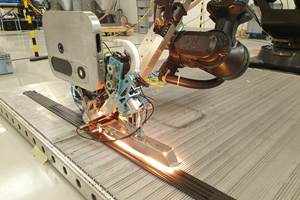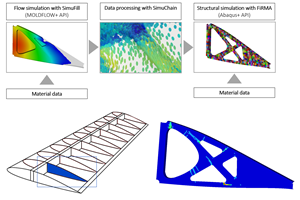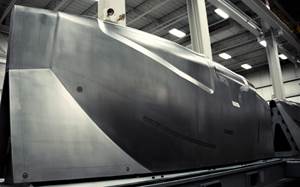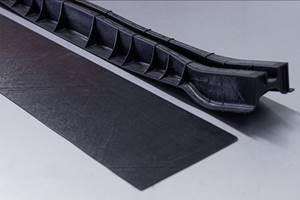Composites feature in Altair’s 8th Annual Enlighten Awards
Recognized jointly with the Center for Automotive Research (CAR), winners represent the world’s best initiatives to reduce vehicle weight and meet emissions targets.

Mubea’s full composite Tension Leaf Spring to substitute multi-layer steel leaf springs with a weight advantage of up to 75%. Source | Altair
Altair (Troy, Mich., U.S.), a global technology company providing solutions in product development, high-performance computing (HPC) and data analytics, announced on August 4 the winners of the 2020 Altair Enlighten Awards. Presented jointly with the Center for Automotive Research (CAR, Ann Arbor, Mich., U.S.), the 8th Annual Enlighten Awards reportedly acknowledges initiatives to reduce vehicle weight and meet emissions targets, as well as breakthrough advancements that push the industry towards a more sustainable future.
“As we sit at the crossroads of science, engineering, art and design, creating a more sustainable future is the essence of Altair,” says James Scapa, founder and chief executive officer of Altair. “I am proud to see that the Altair Enlighten Awards have become a sought-after recognition that acknowledges the world’s greatest automotive lightweighting innovations, while inspiring interest from industries, engineers, policymakers, educators, students and the public.”
Presented in four categories, Altair says the Enlighten Awards recognize commercial automotive lightweighting achievements and technologies. The 2020 winners include:
- Full Vehicle winner: Harley Davidson Motor Company (Milwaukee, Wis., U.S.) used electrification to improve energy capacity of its Livewire electric motorcycle by 90%, while increasing the ratio of energy capacity to vehicle mass by 60%. In addition to further improvements, this initiative established mass and stiffness design and optimization practices for future motorcycle programs. COMPOSITES: Although the Livewire uses an aluminum frame, Harley-Davidson offers a carbon fiber upgrade option and as a prototype, the electric bike featured a carbon fiber-reinforced final drive belt to deliver power to its rear wheel via a clutch-less direct drive
- Runner-up: Nissan (Yokohama, Japan) for its new Sentra 2020 platform, designed to improve safety and dynamic performance without increasing weight by using simulation to place the right materials in the right locations.
- Module winner: An industry first, Toyota (Aichi, Japan) created a free-standing, two-occupant injection molded back-frame with no molded reinforcement for the 2021 Sienna. It consolidated 15 components to one part with one injection, driving down costs by 15%, reducing mass by 30% and maintaining two times the safety performance.
- Runner-up: ZF Friedrichshafen AG (ZF, Friedrichshafen, Germany) created the first-to-market electric park brake (EPB) with more than 75 million vehicles fitted with EPB for world roadways. The heavy duty EPB offers a weight savings of 25 pounds or more for large trucks and SUVs when compared to conventional drum-in-hat park brakes.
- Enabling Technology winner: Mubea (Attendorn, Germany) developed
a glass fiber-reinforced polymer (GFRP) Tension Leaf Spring with weight savings of up to 75% compared to a standard multi-layer steel spring. The company used a scripted and automated workflow that begins from a parametrized spring model in which all spring parameters can be adapted.- Runner-up: DuPont’s (Wilmington, Del., U.S.) BETASEAL bonded thermoplastic liftgates for its use of BETASEAL X2500 structural adhesive, which quickly joins thermoplastic inner and outer panels and enables modular lightweight assembly. The company’s Magna thermoplastic liftgates bonded with BETASEAL X2500 structural adhesive have realized a 20-30% weight savings compared to welded steel liftgates. COMPOSITES: Magna’s thermoplastic composite liftgates enable a 25-45% reduction in part count, 20-30% reduction in mass and 25-35% reduction in investment cost.
- Honorable mention: Mazda’s computer-aided engineering (CAE) multi-disciplinary design optimization (MDO) methodology captures top technology trends by applying simulation-driven design and data analytics for product design.
- Future of Lightweighting winner: Marelli (Corbetta, Italy) developed a
new advanced sheet compression molded suspension steering knuckle that ensures a 25% mass savings compared to the aluminum version used on the Jeep Compass, and a 50% savings compared to the cast iron version. COMPOSITES: This steering knuckle contains the wheel and attaches to the suspension and steering components. Made from chopped carbon fiber molding compound, this composite material is more resistant to cracking and made viable for automotive production thanks to the Advanced Sheet Molding Compression (ASMC) manufacturing process, a high-volume, high-pressure method suitable for molding complex, high-strength materials. Using a 1500-ton press, Marelli demonstrated complex structural parts that meet performance requirements produced in a one-shot, net shape process suitable for automotive volumes.
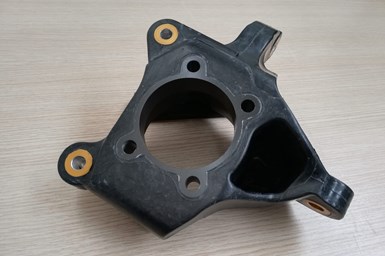
ASMC suspension steering knuckle from Marelli (right view). Source | Altair
- Runner-up: Nissan’s ultimate lightweight aluminum/carbon fiber reinforced polymer (CFRP) body side panel using topology design reduced weight by utilizing a multi-material structure of aluminum and short fiber carbon fiber reinforced thermal plastic (CFRTP). Compared to conventional steel body side panels, it can reduce weight by approximately 50%. COMPOSITES: Although Nissan has not released further details, short fiber CFRTP is being used by General Motors (Detroit, Mich., U.S.) in the CarbonPro pickup box for its 2019 short-bed (crew-cab) GMC Sierra AT4 (off-road) and Sierra Denali half-ton pickups. The Sereebo CFRTP sheet composite is supplied by Teijin (Tokyo, Japan).
“We are proud to offer the automotive industry’s only award dedicated to vehicle lightweighting and are thrilled to see how many advancements are made through the use of optimization technologies,” says Richard Yen, Altair senior vice president, global industry verticals. “Each year the entries are more and more impressive, making it increasingly difficult to select the winners as entrants are making great strides in lightweighting, and using inventive approaches through simulation and materials.”
“On behalf of myself and the Toyota North American Research and Development team, it is an honor to accept this Altair Enlighten Award for the resin back-frame in the new Toyota Sienna third row seat. We are excited to release this industry-leading seat back that focuses on customer satisfaction with lighter touch and ease of operation,” says Todd Muck, senior principal engineer, Toyota TSPO – Advanced Development Group. “Strong teamwork and collaboration allowed us to accept the monumental challenge of lightweighting and improved performance while still achieving a lower cost. The final design, which demonstrates a reduction in both weight and cost, is a testament to our entire Toyota development team and the invaluable support of our supplier partner, BASF [Ludwigshafen, Germany]. We turned a dream into reality by creating something entirely new for this vehicle segment.”
Carla Bailo, president and chief executive officer at CAR notes that “Design optimization is critical for every new product in the automotive industry and lightweighting is a key component. We are honored to collaborate with Altair in acknowledging these design innovations in the automotive sector. CAR’s multidisciplinary approach gives us a clear viewpoint on critical issues facing the global automotive industry and it is thrilling to see advancements in lightweighting making an immediate impact.”
Altair announced the winners in an awards ceremony on August 4, 2020. For more information on the Enlighten Award, please visit https://www.altair.com/enlighten-award/.
Related Content
ATLAM combines composite tape laying, large-scale thermoplastic 3D printing in one printhead
CEAD, GKN Aerospace Deutschland and TU Munich enable additive manufacturing of large composite tools and parts with low CTE and high mechanical properties.
Read MoreImproving carbon fiber SMC simulation for aerospace parts
Simutence and Engenuity demonstrate a virtual process chain enabling evaluation of process-induced fiber orientations for improved structural simulation and failure load prediction of a composite wing rib.
Read MoreNine factors to consider when designing composites cure tooling
Gary Bond discusses the common pitfalls and compromises when designing good cure tooling and their holistic significance for a robust composite production process.
Read MoreOptimized approach to predict delamination failure in CFRTP structures
ARRK Engineering and Mitsui Chemicals improved delamination prediction accuracy to help optimize absorbed energy/failure load for an overmolded TAFNEX CF/PP UD tape bumper beam.
Read MoreRead Next
All-recycled, needle-punched nonwoven CFRP slashes carbon footprint of Formula 2 seat
Dallara and Tenowo collaborate to produce a race-ready Formula 2 seat using recycled carbon fiber, reducing CO2 emissions by 97.5% compared to virgin materials.
Read MoreVIDEO: High-volume processing for fiberglass components
Cannon Ergos, a company specializing in high-ton presses and equipment for composites fabrication and plastics processing, displayed automotive and industrial components at CAMX 2024.
Read MoreDeveloping bonded composite repair for ships, offshore units
Bureau Veritas and industry partners issue guidelines and pave the way for certification via StrengthBond Offshore project.
Read More

















.jpg;maxWidth=300;quality=90)




